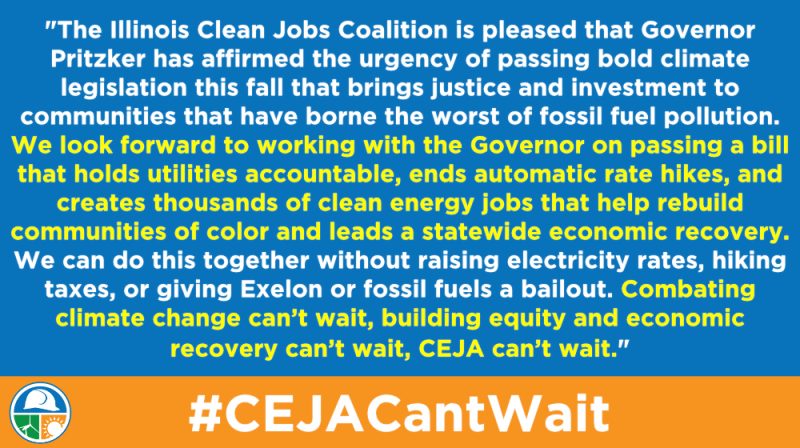Saying the “need for comprehensive energy reform in Illinois has never been greater,” Gov. J. B. Pritzker’s administration reopened discussions on legislation to protect Illinois consumers and move the state to 100% clean energy, giving hope to advocates who have urged passing legislation this year.
(Send a message to the governor about this positive development.)
In a 13-page document, “Putting Consumers and Climate First,” the governor’s office outlined eight principles that can serve as a starting point for discussions, which have been delayed by the pandemic and ComEd’s ethics scandal. CUB was pleased that the governor’s principles emphasized energy efficiency, affordability, equity and utility accountability:
-
Strengthen Utility Company Transparency & Ethics Requirements
-
Expand consumer affordability protections.
-
Make Illinois a renewable energy leader and phase out dirty power.
-
Implement a market solution to support renewables.
-
Electrify and Decarbonize Illinois’ Transportation Section.
-
Support communities transitioning to clean energy.
-
Push for equity in the new clean energy economy.
-
Expand Energy Efficiency
“When it comes to clean energy innovation, Illinois is a leader in the Midwest, and by working together we can build on that progress to protect consumers and the climate,” Gov. Prizker said in a news release.
The Clean Jobs Coalition  was pleased with the development, as was CUB, which said in a statement: “This is our best opportunity in decades to pass strong clean energy legislation without raising power bills, increasing taxes or giving Exelon or fossil fuel companies a bailout.”
was pleased with the development, as was CUB, which said in a statement: “This is our best opportunity in decades to pass strong clean energy legislation without raising power bills, increasing taxes or giving Exelon or fossil fuel companies a bailout.”
For the last 18 months, CUB and the Clean Jobs Coalition have advocated for the Clean Energy Jobs Act (CEJA), comprehensive, consumer-friendly energy legislation in Springfield. “We look forward to discussing all the alternatives so Illinois can find the cheapest, fastest way to achieve 100 percent clean energy in the state,” CUB said.

